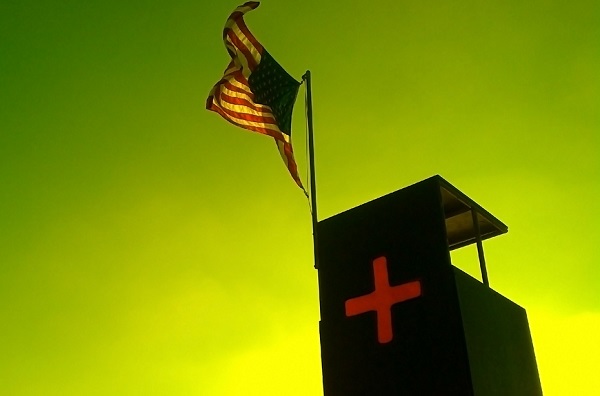
Damon Linker, who is best-known for defecting from First Things towards the center-left (you can read about his intellectual journey in this interview I conducted with him), made quite a splash yesterday by daring to question the left’s narrative about what Trump followers represent in his column Liberalism’s Blind Spot:
Underlying liberal denigration of the new nationalism — the tendency of progressives to describe it as nothing but “racism, Islamophobia, and xenophobia” — is the desire to delegitimize any particularistic attachment or form of solidarity, be it national, linguistic, religious, territorial, or ethnic. As I explained shortly after the Brexit vote, cosmopolitan liberals presume that all particularistic forms of solidarity must be superseded by a love of humanity in general, and indeed that these particularistic attachments will be superseded by humanitarianism before long, as part of the inevitable unfolding of human progress.
For such liberals, any outlook that resists or rejects humanitarianism is an atavistic throwback to less morally pristine times, with the present always superior to the past and the imagined even-more-purely humanitarian future always better still.
Concerned about immigrants disregarding the nation’s borders, defying its laws, and changing its ethnic and linguistic character? Racist!
The reaction was so swift, copious, and highly negative that I wouldn’t even know where to start, so you’ll have to dive in yourself by searching on Twitter.
The left understandably felt betrayed by someone they perceived as a man of the left. However, if you read through all of Just Another Atheist Jewish Catholic: An Interview With Damon Linker (and there is a lot of it), then you will realize there is much more to the man, a depth of thought that makes him an intellectual worth following.
Below I reproduce Damon Linker’s defense of Liberalism’s Blind Spot with his permission. You’ll find my stage directions in bold face. I’m throwing myself into the fray not because I have any great love for Trump, but because the blind spots Damon points out are so much in line with the immense blind spots I’ve seen in connection with coverage of Poland’s new “nationalist” government.
Linker’s defense begins with:
So, I wrote a column today that sparked an intense fury on Twitter. In sum: I argued that the nationalistic instincts that have given birth to Donald Trump in the U.S. and the anti-EU movement in Europe are not reducible to “racism, Islamophobia, and xenophobia.” Hundreds of center-left and left-leaning journalists and fellow-travelers then delighted in an An Hour of Hate at the column’s expense that amounted to saying, “Of course it’s just racism, you idiot!” Finally, a thoughtful journalist friend of mine here on Facebook made that same case in much more polite language. I thought some might appreciate reading what I wrote in reply:
Here the “thoughtful reply” in its entirety:
Damon: I hope not to be one of your screaming liberal interlocutors — I agree that liberals can cry “racism” way too often, though I think conservatives give it short shrift in their own analyses of societal problems — but I do think your piece kind of whistles its way past some history and practical experience here.
This is your paragraph where I got caught up most of all: “”Love of one’s own” had been recognized as a potent and permanent motive force in politics all the way back to the beginning of Western civilization, when Homer and Sophocles depicted it and Plato analyzed it. It simply never occurred to liberals prior to the mid-20th century that human beings might one day overcome particularistic forms of solidarity and attachment.”
The phrase “love of one’s own” does a lot of work here, and does a lot of positive framing – “solidarity” and “attachment.” Sounds nice.
It’s also rather similar to the phrasing used by people we do know to be racist. Can we agree that David Duke, former KKK member, fits the definition of racist? Here he is in 2006: “I don’t consider myself a racist, I don’t hate other peoples, but I certainly want to preserve my own. And I think that’s true of all people.
“Love of one’s own,” we see, is frequently used to make white supremacy go down easy. So frequently that it sounds more like a dog whistle than something liberals might and should find positive.
Back to your piece:
“It simply never occurred to liberals prior to the mid-20th century that human beings might one day overcome particularistic forms of solidarity and attachment.”
Well: Let’s think about where we’d arrived in the mid-20th century. We were just starting — barely, as I understand it — to grapple with the enormity of the Holocaust, which killed 6 million Jews in the name of a regime that really, really loved a particular kind of people. And this had followed centuries of killing on the European continent, war after war in which various nationalisms were deemed worth killing and dying for, leaving everybody exhausted and wanting an end to it already. Domestically, we were at the outset of a civil rights movement in a country that was happy to send black men to war but not to make them equal citizens at home. If liberals have taken their cosmopolitanism too far, it has its roots in something real and genuine — that the nationalisms you praise have often been destructive, even genocidally so.
Finally: One needn’t be racist to be a Donald Trump supporter. But your piece focuses so much on the rhetoric of nationalism, pro- and con-, that it fails to take into account other pieces of evidence. As I mentioned in my column with Ben last week: “So it’s no surprise that polls show, as Vox has reported, that “compared to white people, black people are viewed by Trump supporters as less intelligent, more lazy, more rude, more violent, and more criminal. About 40 to 50 percent of Trump supporters held at least one of these views, while fewer than 35 percent of Clinton supporters did.””
Such attitudes reflect more than a love of one’s own, but a contempt for the other. If they do not meet the definition of racism, nothing does. History shows it’s difficult to have a love of one’s own that doesn’t, to some extent, dehumanize those not in the group — and that, we know, has terrible, terrible consequences. Liberals are right to be on guard.
Linker’s reply then continues with…












